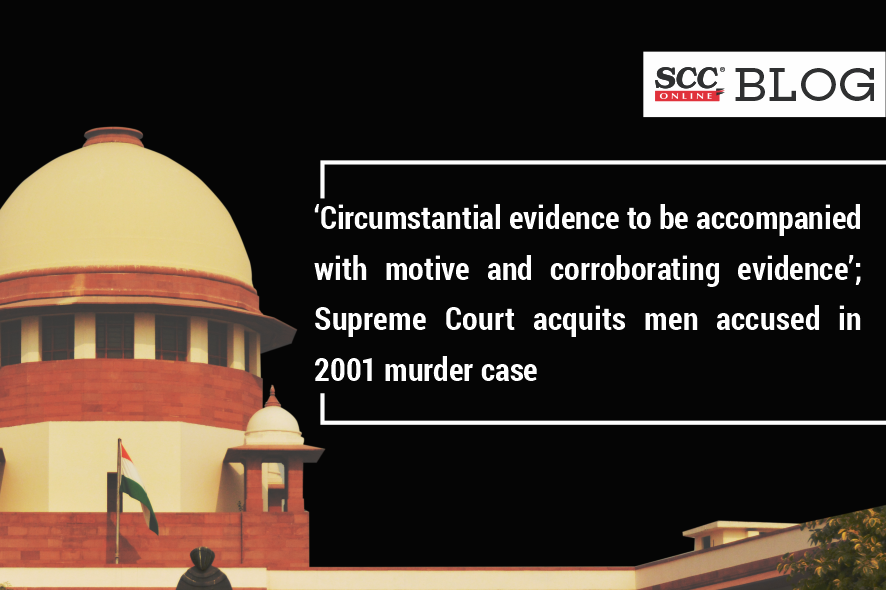Supreme Court: While exercising its criminal appellate jurisdiction, the division bench of Ajay Rastogi and C.T. Ravikumar* held that though the deceased had met with a homicidal death, it cannot be said that the rest of the circumstantial evidence culled out by the Courts below unerringly point to the culpability of the appellants in the homicidal death and accordingly acquitted the appellants.
In the matter at hand, the appellants were convicted by the Trial Court under Sections 302 read with Section 34 of the Penal Code, 1860 (‘IPC’) who were sentenced to undergo imprisonment for life and were subjected to fine of Rs 500/- in default of payment of fine or undergo rigorous imprisonment for one month each. The same was upheld by the Bombay High Court, hence the present appeal. Admittedly, there were no eye-witnesses and on the basis of circumstantial evidence, the Trial Court had found the appellants guilty which was challenged before the High Court.
The Court opined that if doubt lingers with respect to the probability or conclusiveness of any circumstance relied on by the prosecution, forming a link in the chain of circumstances pointing to the guilt of convict, despite the existence of concurrent findings, the evidence has to be scrutinized so as to ensure that the totality of the evidence and circumstances relied on, did constitute a complete chain and directly points to the guilt of the convict.
The Court while agreeing with the view of the Trial Court, considered the Prosecution Witness-13 (‘PW-13’) along with the post-mortem report that made the Courts below to concurrently come to the conclusion that death of the deceased was homicidal in nature due to the presence of 22 ante-mortem injuries on the body of the deceased.
The Bench while relying on Nandu Singh v. State of Madhya Pradesh, 2022 SCC OnLine SC 1454, stated that where the conviction was based on circumstantial evidence, motive assumes great significance. The Court was of the view that the prosecution had failed to establish motive which was rightly observed by the Trial Court. However, despite the said finding, the Courts below did not consider the said aspect.
The Bench stated that the High Court had relied and confirmed the conviction of the appellants on the basis of the ‘last seen’ theory. In a case which is rested on circumstantial evidence and ‘last seen’ theory, the evidence relating to the time at which the deceased was lastly seen with the accused had to be proved conclusively with the proximate time of finding the dead body. Further, the burden to establish the innocence would be that of the accused.
The Bench stated that the Courts below in the overall circumstances, ought to have carefully considered the question whether the solitary oral evidence of PW-8 would conclusively prove the factum of the deceased lastly seen in the company of the deceased. It stated that both the Trial Court and the High Court failed to make a proper exercise of that task taking into account the fact that the prosecution relied only on circumstantial evidence to establish the guilt of the accused. The evidence of PW-10 not only failed to lend corroboration to the evidence of PW-8 but also puts it under a shadow of doubt. Hence, the Court stated that the High Court erred in holding that circumstantial evidence of ‘last seen’ stated by PW-8 corroborated with the evidence of PW-10.
The Court stated that in such circumstance, though the deceased had met with a homicidal death, it cannot be said that the rest of the circumstantial evidence culled out by the Courts below unerringly point to the culpability of the appellants in the homicidal death.
With this observation the Court acquitted the appellants while stating that the circumstances relied on by the prosecution and held as proved by the Courts below failed to point out the guilt of the appellants making it unsafe to maintain the conviction of the appellants, extending them the benefit of doubt.
[Shankar v State of Maharashtra, 2023 SCC OnLine SC 268, decided on 15-03-2023]
*Judgment authored by Justice C.T. Ravikumar.
Advocates who appeared in this case:
For the appellants- Mr. Sanjay Jain, AOR Mr. Sunil Kumar Verma, AOR Mr. Sunil Kumar Verma, Adv.;
For the respondents- Mr. Sachin Patil, AOR Mr. Siddharth Dharmadhikari, Adv. Mr. Aaditya Aniruddha Pande, Adv. Mr. Bharat Bagla, Adv. Mr. Sourav Singh, Adv. Mr. Geo Joseph, Adv. Mr. Risvi Muhammed, Adv. Mr. Durgesh Gupta, Adv.






